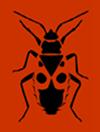一种本地黄蜂和一种非本地黄蜂之间的间接相互作用(膜翅目:蜂科;蜂科:前蜂科)
IF 1.2
3区 农林科学
Q2 Agricultural and Biological Sciences
引用次数: 2
摘要
非本土物种对本土生物构成威胁。当非本土物种和本土物种关系密切时,前者往往会竞争性地排斥后者。许多研究都集中在非本土真社会性膜翅目昆虫对本土昆虫物种的竞争排斥上,包括蚂蚁、黄蜂、纸黄蜂和蜜蜂。尽管许多地区已经引入了独居黄蜂物种,但很少有研究调查这些昆虫对其本地同类的影响。我们研究了属于同一属(膜翅目:胡蜂科:真蜂亚科:Anterhynchium)的本地和非本地独居黄蜂之间的竞争性相互作用。具体而言,我们于2019年6月至10月在日本兵库县高砂市的森林边缘使用陷阱巢(竹竿)比较了本地Anterhynchium fl avomarginatum和据称是非本地的A.长臂猿的资源使用和天敌。在950根竹竿中,分别有70根(7.4%)和50根(5.3%)被A.fl avomarginatum和A.gibbifrons用作巢穴。在所研究的这段时间里,Anterhynchium fl avomarginatum产生了两代,而A.gibbifrons只产生了一代。虽然长臂猿在A.fl avomarginatum后两周开始筑巢,但长臂猿的筑巢期与A.fl Avomarginatium的第一个筑巢期重叠。这两个物种的巢结构和使用的藤条内径相似,这表明它们可能会争夺筑巢资源。Anterhynchium fl avomarginatum使用了14种蛾类(鳞翅目:Crambidae、Pyralidae、Tortricitidae)的幼虫作为其幼虫后代的食物,而A.长臂猿只使用了一个物种,Demobotys pervoulgalis(鳞翅目的:Crambida)。猎物是每种黄蜂独有的物种,这表明对这种资源没有竞争。三种寄生蜂,Macroaiagon nasutum(鞘翅目:鳞翅目)、Amobia distorta(双翅目:Sarcophagidae)和Megaselia sp.(双翅目的:Phoridae),攻击了这两个Anterhynchium物种。畸变阿莫比亚寄生率在本地A.fl avomarginatum中较高。Anterhynchium长臂猿可能通过共享的寄生蜂间接影响A.fl avomarginatum。本文章由计算机程序翻译,如有差异,请以英文原文为准。
Indirect interactions between a native and a supposedly non-native wasp species (Hymenoptera: Vespidae: Eumeninae: Anterhynchium)
Non-native species pose a threat to native organisms. When non-native and native species are closely related, the former can often competitively exclude the latter. Many studies have focused on competitive exclusion of native insect species by non-native eusocial hymenopterans, including ants, hornets, paper wasps and bees. Although solitary species of wasps have been introduced in many regions, few studies have investigated the effects of these insects on their native congeners. We investigated competitive interactions between native and non-native solitary wasps belonging to the same genus (Hymenoptera: Vespidae: Eumeninae: Anterhynchium). Specifi cally, we compared resource use and natural enemies of the native Anterhynchium fl avomarginatum and supposedly non-native A. gibbifrons at a forest edge in Takasago, Hyogo, Japan, in June–October 2019, using trap nests (bamboo canes). Of 950 bamboo canes, 70 (7.4%) and 50 (5.3%) were used as nests by A. fl avomarginatum and A. gibbifrons, respectively. Anterhynchium fl avomarginatum produced two generations over the period studied, whereas A. gibbifrons produced only one. Although A. gibbifrons began nesting two weeks after A. fl avomarginatum, the nesting period of A. gibbifrons overlapped that of the fi rst nesting period of A. fl avomarginatum. Nest architecture and the inner diameter of the canes used by both species were similar, suggesting potential competition for nesting resources. Anterhynchium fl avomarginatum used larvae of 14 species of moths (Lepidoptera: Crambidae, Pyralidae, Tortricidae) as food for their larval offspring, whereas A. gibbifrons used only a single species, Demobotys pervulgalis (Lepidoptera: Crambidae). Prey species were exclusive to each wasp species, indicating no competition for this resource. Three parasitoid species, Macrosiagon nasutum (Coleoptera: Ripiphoridae), Amobia distorta (Diptera: Sarcophagidae) and Megaselia sp. (Diptera: Phoridae), attacked both Anterhynchium species. The percentage parasitism by Amobia distorta was higher for the native A. fl avomarginatum. Anterhynchium gibbifrons may indirectly affect A. fl avomarginatum via shared parasitoids.
求助全文
通过发布文献求助,成功后即可免费获取论文全文。
去求助
来源期刊
CiteScore
2.30
自引率
7.70%
发文量
43
审稿时长
6-12 weeks
期刊介绍:
EJE publishes original articles, reviews and points of view on all aspects of entomology. There are no restrictions on geographic region or taxon (Myriapoda, Chelicerata and terrestrial Crustacea included). Comprehensive studies and comparative/experimental approaches are preferred and the following types of manuscripts will usually be declined:
- Descriptive alpha-taxonomic studies unless the paper is markedly comprehensive/revisional taxonomically or regionally, and/or significantly improves our knowledge of comparative morphology, relationships or biogeography of the higher taxon concerned;
- Other purely or predominantly descriptive or enumerative papers [such as (ultra)structural and functional details, life tables, host records, distributional records and faunistic surveys, compiled checklists, etc.] unless they are exceptionally comprehensive or concern data or taxa of particular entomological (e.g., phylogenetic) interest;
- Papers evaluating the effect of chemicals (including pesticides, plant extracts, attractants or repellents, etc.), irradiation, pathogens, or dealing with other data of predominantly agro-economic impact without general entomological relevance.

 求助内容:
求助内容: 应助结果提醒方式:
应助结果提醒方式:


